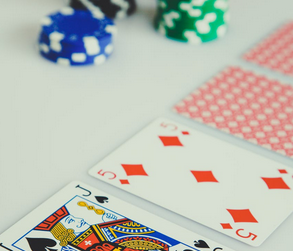On one side of the table you can be a dealer – you’ll need to know the table and the games, know how to keep the games ticking along and occasionally deal with a dispute, and do it all with a smile on your face.
On the other side of the table as well as the recreational gamblers there are poker pros. It’s a long way from being a conventional career and it is, of course, a much riskier way to make money from cards. But for those with the temperament to manage risk and deal with their profits and losses responsibly, it can be a far more lucrative way to make a living.
Plus, the two jobs are naturally linked – pros including Layne Flack, Mike Matusow and Scotty Nguyen have all at one time or another worked as a dealer.
What it takes to be a poker dealer
First things first - if you’re based in the UK, you’ll need to have a personal functional license for gambling before you start work. It costs £185 and is valid for five years. To complete the application you need various admin-related details, such as your addresses for the previous five years and ID documents. You’ll be subject to either a Disclosure and Barring Service (DBS) electronic check (if you live in England or Wales) or if you live north of the Scottish border a Disclosure Scotland form will need to be completed.
Unlike in the US, however, you won’t be required to complete specific training just to be legally allowed to work at a poker table.
In the States it’s a little more involved, with potential dealers in states such as Las Vegas required to complete training first. The costs for classes begin at around $500 and can include around 100 hours of training.
As a croupier in the UK, however, you’ll be trained by your employer, potentially at a range of games, not just poker.
The skills you’ll need
That doesn’t, however, mean that it’s easy to get through the door. You’ll need to be a quick thinker and good with numbers (quick calculations are part and parcel of the job). Good decision-making skills are essential, as are strong communications and customer service skills.
In terms of training, you’ll typically do three months of initial training, before being moved onto the casino floor for on-the-job training that will last anywhere from 12 to 18 months.
From the casino floor you can move on to be a dealer inspector or a pit boss, and a little further up the ladder are roles as a casino manager.
The conditions

There are a few constants across the job, regardless of where you work. The hours do tend to be long and skew towards night time work, so it’s worth keeping that in mind. You also need to think about the fact that you may have to deal with the occasional sore loser.
That said, it’s a social job and you would be working with people out to have a good time. On the level of local casinos you’ll typically be dealing with people out to have a good night, and there are worse ways to spend an evening. At the higher end of the profession, you could be working in top-end casinos that are decked out for luxury and glamour. If you enjoy interacting with the public, becoming a poker dealer can be a great career move.
Life as a professional poker player
Becoming a professional poker player, meanwhile, requires the same sort of knowledge of the game and the cards as well as some of the same skills, but also comes with all the incumbent stress of knowing that the money on the table is your own. Of course, the rewards are potentially much higher too.
The most obvious requirement for being a professional poker player is, naturally, an aptitude for the game. You have to be able to wrap your head around the myriad complexities and strategies in play, and do it with a cool head.
Of course, the same could be said for being a good amateur player. For a pro, there are other factors to manage.
The biggest is arguably variance. Sometimes you’ll win, sometimes you’ll lose. How you handle losing is more important than how you handle winning. You can’t play if a prolonged downswing has eaten up your entire bankroll, so managing it and keeping a layer of financial insulation in place at all times is essential if you want to be in it for the long haul.
Likewise, if you’re in a downswing it can take an emotional toll, which isn’t good for your wellbeing and isn’t good for your poker, either. You’ll need to take accurate stock of your win-rate and use that to treat poker like a pro, not getting dragged down by the lows.
That said, if you can keep on top of the cons of being a poker pro, it’s an opportunity to do something you love and make money from it. Professional poker offers a lot of flexibility and freedom. You get to decide when and where you play and be accountable only to yourself, and the earning potential is significant.
If you have the right temperament for it, work on either side of the poker table can be extremely rewarding.






